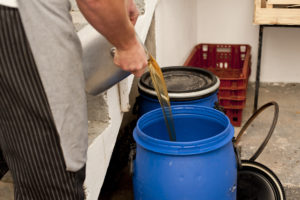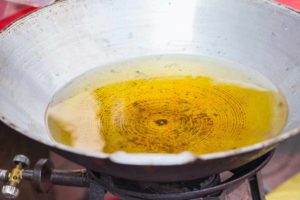As a restaurant owner, you’re likely no stranger to the challenges of managing waste. From food scraps to packaging materials, the amount of garbage produced by a busy restaurant can be overwhelming. But there’s one type of waste that often goes overlooked: used cooking oil. While it may seem like a minor concern, improperly disposing of oil can have serious consequences for both the environment and your business.
But don’t despair – starting an oil recycling program in your restaurant is easier than you think, and it can bring a host of benefits, from reducing your carbon footprint to earning some extra cash. In this article, we’ll explore the reasons why oil recycling is important, the steps to get started, and some tips for making the most of your program. So let’s dive in!
Why Recycle Used Cooking Oil?
Used cooking oil can clog sewer systems, pollute waterways, and harm wildlife. Improperly disposing of used cooking oil can also lead to fines and penalties from local environmental agencies.

Recycling used cooking oil, on the other hand, has several benefits. It can reduce the amount of waste that your restaurant generates. Help protect the environment by keeping used oil out of the sewer system and waterways. Provide a valuable resource for other industries, such as biofuel and animal feed production. Potentially generate revenue for your restaurant, as some recycling companies may pay for your used oil.
How to start the program?
If you’re unsure of how to recycle your fryer oil or how to start a recycling program, don’t worry. This guide will provide you with a complete overview of cooking oil recycling. Biodiesel, a fuel that significantly reduces greenhouse gas emissions, is made using used cooking oil. As a result, recycling cooking oil not only reduces waste but also contributes to a more sustainable image for restaurants.
1. Do a thorough waste audit
You can measure and examine waste generation with the use of a waste audit. You can create plans to manage waste using the information provided. Also, it will assist you in locating chances and ways to boost your bottom line.
Have all frying oil stored in cooking oil disposal containers so that you can conduct a waste audit? Each container should be marked with the time and place. Weigh each container, then enter the weight into your audit template.
2. Contact a food waste recycling company
For your restaurant, a reputable food waste recycling business can recycle cooking oil. The team is on call round-the-clock. And not just that. They can work with you to create an efficient method for recycling restaurant oil.
This makes it easier to manage used frying oil properly. Also, it enhances your brand’s reputation for sustainability with customers. Use the phrase “cooking oil recycling near me” to find a company that recycles food waste in your neighborhood. Or you can benefit from the best oil recycling company, NJ Oil Recyclers.
3. Make a schedule for used cooking oil collection
How frequently did the business pick up the used frying oil? Well, the timing of your cooking oil collection depends on how quickly you can fill your containers. To assure the collection of used cooking oil, keep the lines of communication open.
The used cooking oil will thereafter be collected at the appropriate time by the company that recycles food waste.
4. Adhere to the rules
Most localities have implemented strict regulations regarding the disposal of fats, greases, and oils. Make sure to be aware of the rules and standards before disposing of your old cooking oil.
There would be severe fines and punishments if the codes are not followed. Your business license can also be canceled. Work with a business that turns spent cooking oil into biodiesel to adhere to the rules. This will guarantee that your company benefits the environment.

5. Choose a motivated worker to oversee the recycling program
Nominate a zealous employee to rally support for the recycling program. He or she will train the team as well as sensitize the other members. Recall that a restaurant produces more waste than just used cooking oil.
Other materials include food waste, glass, plastic, and cans. Encourage recycling by providing rewards and incentives. Provide information about your recycling program in the materials you provide new employees.
6. Make Your Restaurant’s Used Oil Recycling the Best
Your restaurant’s reputation will benefit from oil recycling. The promotion of recycling activities is aided by clear regulations. To go even further, place signs and banners throughout your restaurant. Contact the most reputable company such as NJ Oil Recyclers if you need any advice on how to get rid of frying oil.
Tips to make the most of your program
Here are some tips in points for an effective cooking oil recycling program:
-
Train your staff
Make sure all employees know how to properly dispose of used cooking oil, and understand the importance of recycling. This can include training on how to safely store and transport oil, as well as guidelines for avoiding spills or accidents.
-
Use designated containers
Provide clearly marked, leak-proof containers for storing used oil. This can help prevent cross-contamination and ensure the oil is easy to transport for recycling.
-
Schedule regular pickups
Coordinate with your waste management provider to schedule regular pickups of your used cooking oil. This can help ensure that your containers don’t overflow and that the oil is properly disposed of in a timely manner.

-
Keep records
Keep track of how much oil you’re recycling, and how often pickups occur. This can help you identify areas for improvement, and also document your sustainability efforts for customers or regulatory purposes.
Wrap up!
Starting an oil recycling program in your restaurant is a decision that not only benefits your business but also the environment. By properly disposing of used cooking oil, you can prevent harmful pollutants from entering our waterways, reduce the risk of grease fires, and even earn some extra cash through recycling incentives. With the right equipment and a commitment to responsible waste management, you can make a positive impact on both your bottom line and the planet.
So, if you’re ready to take the first step towards a more sustainable future for your restaurant, start exploring your oil recycling options today. By working together with your staff, local organizations, and waste management providers such as NJ Oil Recyclers, you can create a program that works for you and your community. Remember, small changes can make a big difference, and by taking action now, you’re investing in a healthier planet for generations to come.



